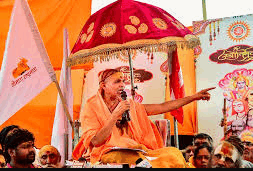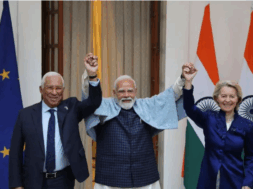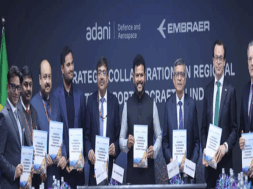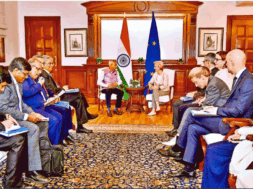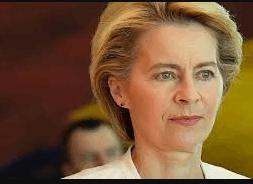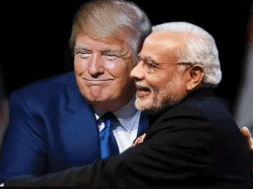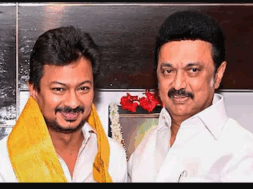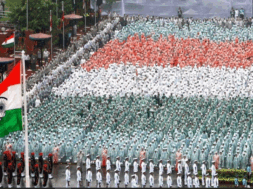
Manas Dasgupta
NEW DELHI, Mar 14: Retired bureaucrats of 1988 batch Sukhbir Singh Sandhu of the Uttarakhand cadre and Gyanesh Kumar from Kerala cadre have been chosen as the election commissioners amidst note of dissent from the leader of the Congress in the Lok Sabha Adhir Ranjan Chowdhury.
The two election commissioners to fill up the vacancies caused by the retirement last month of Anup Pandey and sudden resignation this week by Arun Goel, were chosen by the three-member panel headed by the Prime Minister Narendra Modi with the third member being the Union Home Minister Amit Shah.
The Congress leader hit out at the Centre over the law that replaced the Chief Justice of India by a Union Minister on the selection committee. “The Chief Justice of India should have been on this committee,” he said, adding that the law brought last year had reduced the meeting to a “formality.” “The government is in the majority on the panel. What they want happens.”
Addressing reporters at his residence soon after the meeting ended, Mr Chowdhury said six names came up before the panel for the selection of the two ECs and the names of Mr Sandhu and Mr Kumar were finalised by a majority of members of the high-powered panel. He said there was no clarity on how six names were shortlisted from over 200 candidates that are said to have come before the search committee headed by the Law Minister.
The Congress leader said he was given 212 names for scrutiny last night. “I had asked for a shortlist so that I can examine the candidates. But I did not get that opportunity. I reached Delhi at midnight and the meeting was at noon today. I was given 212 names, how can someone examine so many candidates in a day? Ten minutes before the meeting, I was given a shortlist of 6 names,” he said.
The six names shortlisted were that of Utpal Kumar Singh, Pradeep Kumar Tripathi, Gyanesh Kumar, Indevar Pandey, Sukhbir Singh Sandhu, and Sudhir Kumar Gangadhar Rahate, all former bureaucrats. “Of the six names, the names of Gyanesh Kumar and Sukhbir Singh Sandhu were finalised for appointment as election commissioners,” he said.
“It was fait accompli that the chosen two will be selected. However, I tried to intervene in an appropriate manner so as to bolster the institution. That’s why, before my arrival in Delhi, I sought a shortlist. They gave me a list of all candidates, numbering 212. Now you can imagine if, in a single night, it is humanly possible for me to examine 212 names and find out the most competent person among them,” he said.
The Congress leader said he had given a dissent note, questioning the procedure of selection. Mr Chowdhury also referred to Arun Goel’s resignation as Election Commissioner, which has sparked a row. “When Mr Goel was appointed, the Supreme Court had made a ‘lightning speed’ remark. He came with a lightning speed and left with digital speed,” he said.
Mr Sandhu has earlier held key government positions, including the Chief Secretary of Uttarakhand and chairman of the National Highways Authority of India. Mr Kumar has served as secretary in the Ministry of Parliamentary Affairs and the Amit Shah-led Ministry of Cooperation.
The two officers have been chosen for the Election Commissioner posts a day before the Supreme Court hears petitions challenging the selection process. In the current process, a search committee led by the Law Minister prepares a shortlist. Then, a selection panel led by the Prime Minister and comprising the Leader of the Opposition in Lok Sabha and a Union Minister makes the final choice.
The Supreme Court had in March last year ruled that the panel must have the Prime Minister, the Chief Justice of India and the Leader of the Opposition in Lok Sabha. But the Centre thereafter brought a law to replace the Chief Justice by a Union Minister. The change has tilted the process in favour of the Centre. The Association for Democratic Reforms and Congress leader Jaya Thakur have challenged the process in Supreme Court and the matter will be heard on Friday.
Adhir claimed that the names of the officers shortlisted were not made available to him in advance. The long list included the names of 92 officers who retired as Secretary and Secretary equivalent in the Government of India, 93 names of officers serving as Secretary and Secretary equivalent officers in the Government of India, 15 officers who retired as Chief Secretaries of states and Union Territories in the last one year, 28 and 8 officers serving as chief secretaries in states and Union Territories respectively.
Mr Chowdhury said the government shared with him the names of six shortlisted candidates just “eight to 10 minutes” before the meeting started. The recently enacted Chief Election Commissioner and other Election Commissioners (Appointment, Conditions of Service and Term of Office) Act merely says, “A search committee headed by the Minister of Law and Justice and comprising two other members not below the rank of Secretary to the Government of India, shall prepare a panel of five persons for consideration of the Selection Committee, for appointment as the Chief Election Commissioner and other Election Commissioners.”
“Eight to 10 minutes before the meeting started, the papers of the search committee were shared with me. I was given a short list of six names and Law Minister Arjun Ram Meghwal apprised the selection committee of the details of these six officers, the posts that they had held, their administrative record and all. It was said that the committee has to select two names from this list of six officers,” Chowdhury said.
“Amit Shah then proposed two names — that of Gyanesh Kumar and Sukhbir Singh Sandhu. The Prime Minister then asked whether I would like to say something. I told them that I had already asked the government to make available to me the bio-profiles of shortlisted candidates which would have helped me make an informed decision after going through their profiles,” Chowdhury said.
“But that was not done. I reached Delhi from my constituency last night. And to my surprise, I found an exhaustive list of 212 officers which was delivered at night. How am I supposed to find out details about 212 officers, details about their integrity, experience and administrative capability in such a short time? That is why I had asked for the bio-profiles of the short-listed candidates,” he said.
Chowdhury added, “So, I told the Prime Minister and Home Minister that I have been presented with a fait accompli. I told them you have the majority in the panel, you have an open field, you can do whatever you want. What can I do? And I told them that I would oppose it because there are procedural lapses. I told them that I have nothing against any individual. I don’t know Gyanesh Kumar or Sukhbir Singh Sandhu. I don’t have any friendship or enmity with them. Among the six was one from my home state of Bengal — Indevar Pandey. I know about him … He is considered a good and capable officer. But I told them it is about procedure. If the government wanted the Opposition to be part of the exercise, they should have done it properly so that I could also make a contribution,” he said.
“And if you want to take the Opposition for granted and make the entire exercise a mere formality, then what can I do?” the Congress leader went on to say. “So, I told them that you have proposed these two names, you are merely completing the formality … I will also complete the formality and record my dissent. I told them to take my dissent on record. And the dissent was about the procedural lapses. I am not a magician to find out and go through the details of 212 officers,” Chowdhury said.
“It is clear that they had made their mind on who to appoint and called the meeting just as a formality. It is clear that the government will appoint only a person of their choice,” he said.
Sandhu is a retired IAS officer who was from the 1988 batch of the Uttarakhand cadre and is the Secretary Lokpal at the Centre. On February 3, he was appointed the Secretary to the Lokpal on a one-year contract. His term was to run till February 4, 2025. Earlier, he served as Uttarakhand Chief Secretary and was the National Highways Authority of India (NHAI) chairperson from 2019 to 2021. At the Centre, he also served in the Ministry of Education (formerly known as the Ministry of Human Resource Development).
Gyanesh Kumar is a retired IAS officer from the 1988 batch of the Kerala cadre. He retired as Cooperation Secretary on January 31. During his tenure, the Cooperation Ministry saw the enactment of the Multi-State Cooperative Societies (MSCS) (Amendment) Act, 2023, and the formation of three new national cooperative bodies — the Bharatiya Beej Sahakari Samiti Limited (BBSSL), the National Cooperative Organics Limited (NCOL), and the National Cooperative Export Limited (NCEL).
Kumar has also served as the Parliamentary Affairs Secretary at the Centre. At the time of the Centre’s move to abrogate Article 370 in 2019, he was the Additional Secretary in the Ministry of Home Affairs. During the UPA government, Kumar served as Joint Secretary (Defence Production) in the Ministry of Defence from 2007 to 2012.

